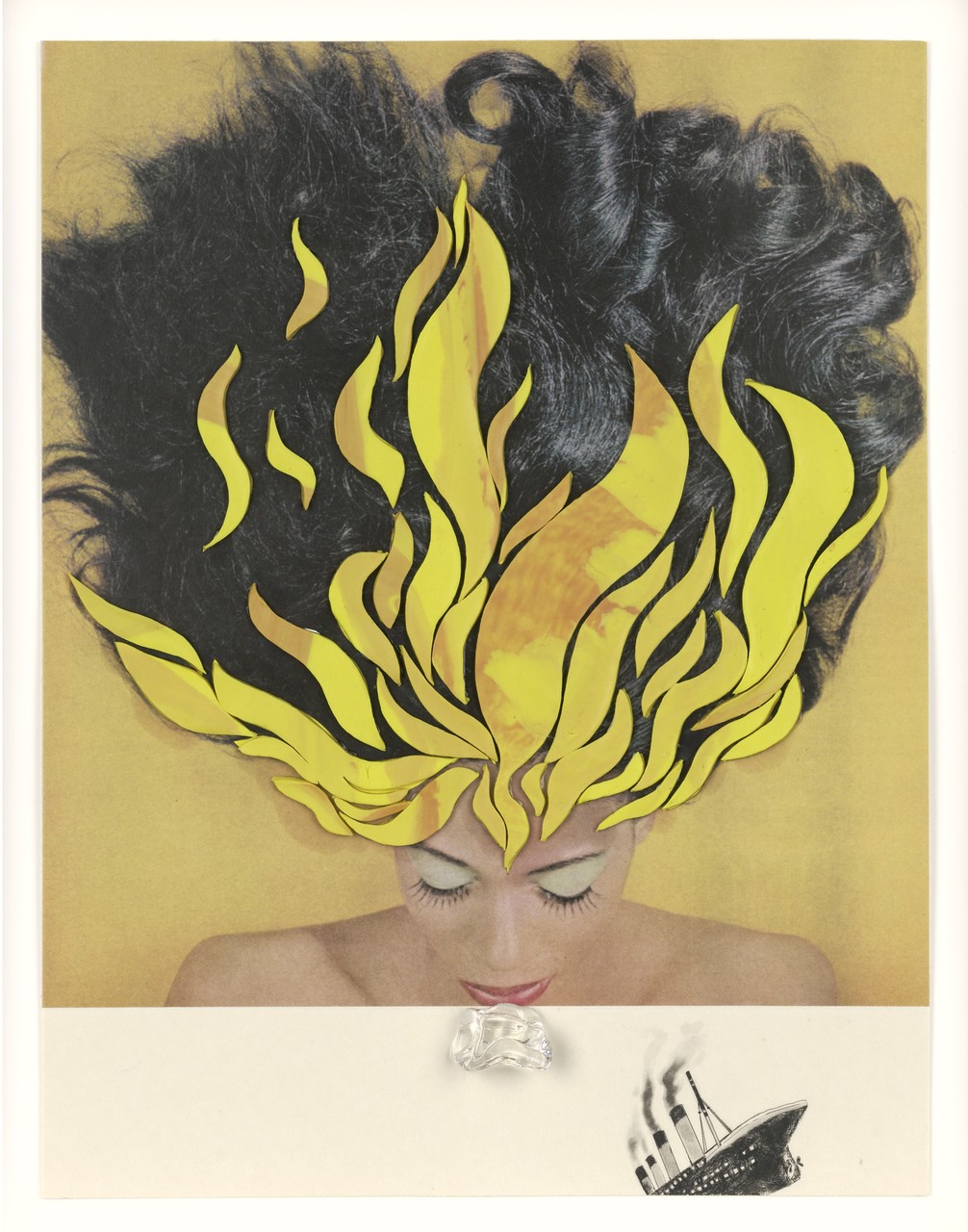The World on Paper
Deutsche Bank Collection
27 Sep 2018 - 07 Jan 2019

Ellen Gallagher: Raveen, from the series DeLuxe, 2004/05
Collage; lithography, etching, glass, and Plasticine,
33 x 26.7 cm
© 2018 Ellen Gallagher. Courtesy of the artist and Hauser & Wirth. Photo credit: Alex Delfanne
Collage; lithography, etching, glass, and Plasticine,
33 x 26.7 cm
© 2018 Ellen Gallagher. Courtesy of the artist and Hauser & Wirth. Photo credit: Alex Delfanne
Paper is easy to use and at the same time experimental. It has an unpretentious, intimate aura, is subtle and haptic. Even in the age of digitaliztion, paper is a medium on which the world is depicted. With around 300 highlights and new discoveries from the Deutsche Bank Collection, The World on Paper shows the fascination the medium of paper has exerted on artists since postwar Modernism and how this at once sensual and pragmatic material has continually opened up new creative possibilities.
The exhibition illustrates the global orientation of the Deutsche Bank Collection. In total, the selection encompasses 133 artists from 34 countries, including Doug Aitken, Joseph Beuys, Ellen Gallagher, Sigmar Polke, Dieter Roth, and Atsuko Tanaka.
The earliest work in the show was executed by Maria Lassnig in 1948, while the most recent was created by Zilla Leutenegger in 2018. For art after 1945, the Deutsche Bank Collection is one of the world’s most important collections of works on paper. The first exhibition at the PalaisPopulaire documents the diversity of this extraordinary art collection, which is present in bank buildings and exhibitions around the globe. The show marks the start of an exhibition series at the new Berlin venue that in the years to come will shed light on ever-new aspects of the collection.
The World on Paper picks up on the architecture of the PalaisPopulaire and presents on three floors three thematic “worlds” that deal with central aspects of contemporary art. The first part is devoted to abstract art. A leitmotif is the empty, white sheet of paper, a mental space in which initially rudimentary forms are shown, which then condense into gestural and geometric compositions and finally into numbers, symbols, words, and ordering systems. The next two sections of the exhibition concentrate on the self-image of people, their view of the body and identity as well as personal and collective history.
The last section investigates artists’ examination of constantly changing urban spaces and deals with technologies and new economic and symbolic functions of images. The exhibition also draws connections to other media and practices: to installation, performance, sculpture, film, theater, literature, and to the graphic novel.
The World on Paper documents how the focus on works on paper gave rise to a young, future-oriented collection. The latter is not only oriented to the epicenters and known protagonists of the art world, but also to peripheral areas: places where young artists and postions that have attracted little attention can be discovered, where new and often surprising worlds are opened up to the viewer.
The exhibition illustrates the global orientation of the Deutsche Bank Collection. In total, the selection encompasses 133 artists from 34 countries, including Doug Aitken, Joseph Beuys, Ellen Gallagher, Sigmar Polke, Dieter Roth, and Atsuko Tanaka.
The earliest work in the show was executed by Maria Lassnig in 1948, while the most recent was created by Zilla Leutenegger in 2018. For art after 1945, the Deutsche Bank Collection is one of the world’s most important collections of works on paper. The first exhibition at the PalaisPopulaire documents the diversity of this extraordinary art collection, which is present in bank buildings and exhibitions around the globe. The show marks the start of an exhibition series at the new Berlin venue that in the years to come will shed light on ever-new aspects of the collection.
The World on Paper picks up on the architecture of the PalaisPopulaire and presents on three floors three thematic “worlds” that deal with central aspects of contemporary art. The first part is devoted to abstract art. A leitmotif is the empty, white sheet of paper, a mental space in which initially rudimentary forms are shown, which then condense into gestural and geometric compositions and finally into numbers, symbols, words, and ordering systems. The next two sections of the exhibition concentrate on the self-image of people, their view of the body and identity as well as personal and collective history.
The last section investigates artists’ examination of constantly changing urban spaces and deals with technologies and new economic and symbolic functions of images. The exhibition also draws connections to other media and practices: to installation, performance, sculpture, film, theater, literature, and to the graphic novel.
The World on Paper documents how the focus on works on paper gave rise to a young, future-oriented collection. The latter is not only oriented to the epicenters and known protagonists of the art world, but also to peripheral areas: places where young artists and postions that have attracted little attention can be discovered, where new and often surprising worlds are opened up to the viewer.
